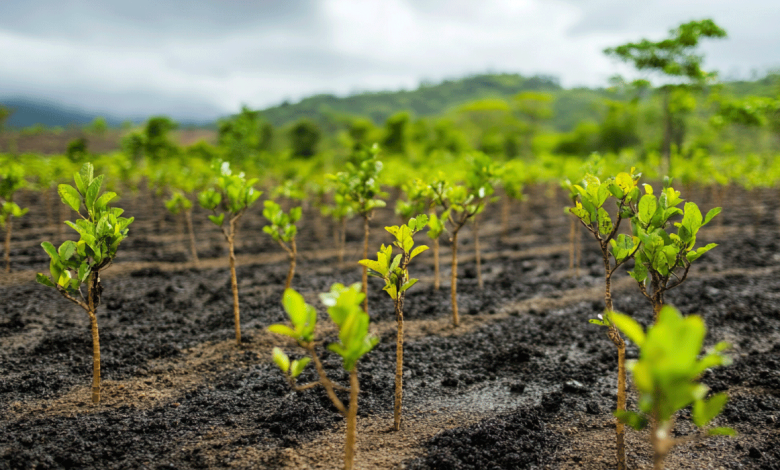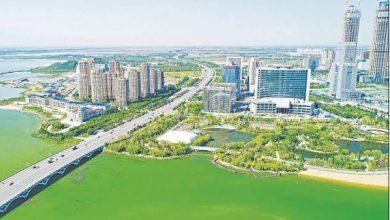Large reforestation project transforms livelihoods in Kilolo

IRINGA: IN June 2021, Udzungwa Corridor Limited (UCL), a private company established to produce carbon-credits, started operations in Mhanga Village, Kilolo District, Iringa Region.
Here, according to Mr Carter Coleman (Director), the company seven-year goal is to reforest with merely native tree species the 7,500-hectare corridor of deforested landscape between Kilombero Nature Forest Reserve (134,511-hectares) and Uzungwa Scarp Nature Forest Reserve (32,763.2-hectaes).
The company estimates that planted trees will remove 4.5 million tons of carbon-dioxide (CO2) from the atmosphere over-thirty years.
The corridor is part of the Udzungwa-Mountains stretching over Morogoro and Iringa Regions are part of the internationally recognised Eastern-Arc Mountains, classified as a global biodiversity-hotspot and recognised as one of the most species-rich montane-forests in the world. These forestsresources’ are also important watershed areas for Tanzania.
Again, 2021 UCL started a project to reforest the abandoned/deforested Udzungwa-corridor. In four years, already transformed the livelihoods of the residents of Mhanga village and neighbouring Uluti-Village through creation of over150 fulltime jobs, over 1000 seasonal jobs and by buying foodstuffs to feed employees and native tree-seeds gathered by the villagers.
When the project started (2021) Mhanga and Uluti villages, the average annual income for a family of five was 360,000/-.
The socio-economic surveys conducted annually by UCL’s Sustainability Officer (Debora Audax) and external enumerators revealed that average family-income increased by 375 per cent to 1,708,485/-.
General outlook around the villages, indicates new prosperity with vivid number of new brick-houses with corrugated-iron sheets roofs replacing mud-homes with thatched roofs.
As part of the 30-year project sustainability plan for the first time, in Mhanga and Uluti villages, the Women’s Savings and Loan Associations have been established, providing women-access to loans for family emergencies and micro-enterprises.
The past-four years’ project efforts demonstrate that a nature-based carbon credit project is long-term commitment to improved ecosystem and the local people livelihoods. In UCL’s case, takes 30 years to grow a native hardwood-plantation.
However, over that period, the project seeks to uplift the local people out of poverty and make the communities more sustainable.
The 7,500 ha of the corridor was deforested long ago, its steep slopes farmed for maize and beans and then abandoned because of poor crop yields as the soil eroded and it distance from the villages or a market.
When the project arrived, it was a sea of tall grass and bracken and the feared ‘upupu’ climbers, which itches terribly if in-contact with the body.
Again, reforesting the area is made more challenging by the absence of roads. Only foot trails can cross the steep-mountain sides.
According to the information provided, past four rainy-seasons, the project planted 3,451 hectares with 3.8 million-trees using seedlings more than 100 nativespecies.
Never before in human history in Tanzania, to have so many different native-species planted on such large manmade native treeplantation.
In order to plant the area, the project established 22 separate-nurseries, each having 500,000-seedlings plus planting camp to house 300 field-workers during planting and weeding.
In one season, the project supply foodstuffs to feed the 1,000 workers required 30,000 separate porter-trips.
According to Mr, Fredrick Jailos, UCL’s Project Managing Director, the project team including workers must operate super-efficiently on large-scale, fulfilling all the plantation activities; tracking number of surviving trees on every acre as well as thousands of payments and costs including making sure materials and food supplies are in each of the 22 workers camps when needed.
In thirty years, when the established-forest stops absorbing carbon-dioxide (CO2), shall stop-producing carbon-credits, then villages will own and continue benefiting from the forestry-asset that cost about 100bn/- to plant and protect.
The new village land forest reserves should then produce 8.7bn/- every other year with oneper cent sustainable timber harvest.
They cannot cut more than that every two years in order to maintain the stock of carbon in the forest.
Thus, in-essence, UCL is building the villages’ future gold-mine. When asked about the project financing mechanisms, Mr Carter Coleman, the UCL Director, reported that project uses carbon finance to plant and protect the forest over 30 years, however, compensating the villages 21.6bn/- in the context of forgone land-benefits during that period.
Again, various field-jobs throughout the project totals 19.3bn/-. Before profits, the total taxes to the government (excluding any special carbon fees), total eight billion.
If the project makes a profit, it will pay 30 per cent corporate-tax and 10 per cent dividend-tax and shall split the rest of the profit 50/50 with the villages.
Mr Coleman further emphasised that UCL is a social enterprise that puts people and the planet before profits.
The company is majority owned by the Tanzania Forest Conservation Group (TFCG) established 1985 as the environmental NGO and minority owned by Reterra Ltd, a London-based carbon-credit company that conceived and financed the project.
As member of the TFCG committee, I visited the project with Mr Ruziko Muheto, also committee-member, who commented: “These villagers are eating carbon money without plantingtrees themselves!”.
Truly, I have rarely seen a project that has brought so many benefits to the people and the environment in such a short time.
Previously, as the Director of Forestry and Beekeeping, Ministry of Natural Resources during my tenure, the Tanzania Forest Service was established (Government Notice No 269 of July 30, 2010) to manage 506 Territorial Forest Reserves plus 8 (eight) Nature Forest Reserves (presumably more added).
Inevitably, Tanzania has enormous potential for nature-based carbon projects, which is an-opportunity for TFS to invest in REDDplus and/or similar activity like the case of Udzungwacorridor by UCL.
Nevertheless, globally and also in Tanzania, the main existing projects are centred on avoided-deforestation which, the international community adopted as key-instrument for Reduced-Emissions from Deforestation and Degradation (REDD-plus).
This is a global mechanism that awards projects that stop deforestation through credits that equal the amount of carbon-released in areas that forests continue being destroyed at the prevailing rate of destruction.
Interestingly, in this case, the forests themselves, aren’t the resources however, high deforestation rate and stopping it is the resource.
While REDD-plus projects can achieve profitability in few years, reforestation projects take much longer and require abundant investments. Furthermore, trees grow-slowly, accordingly UCL doesn’t expect to attain full-production of carboncredits for 15 years after having invested 50bn/-.
For Tanzania to achieve its potential in emerging carbon industry, it requires a national-policy that promotes such investments considering that carbon-credits are not resources like oil/gold in the ground.
Generally, carbon-credits are related to forests/trees; produced by investment-inactivities that stop deforestation or planting-trees often considered as nature-based solutions.
Thus, authorities should encourage investments that make Tanzania competitive in the carbon world-market through reforestation and planting trees in degraded landscapes.
Thus, carbontrading can be treated like any-other business, however, the tax-rules for carboncredit revenues should be treated in a different-way.
Reforestation/afforestation activities directly help with climate-change including sustainable-development aspects.
In-that-context, taxpolicies should be carefully intended to offer tax-incentives and/or exemptions to encourage participation in carbon-markets.
In addition, important to-support broader environmental goals, instead of imposing-taxes that might slowdown progress in carbon-removals; UCL shows the impact that is possible and most-likely, Tanzania could be forerunner in the innovative global carbon industry.





